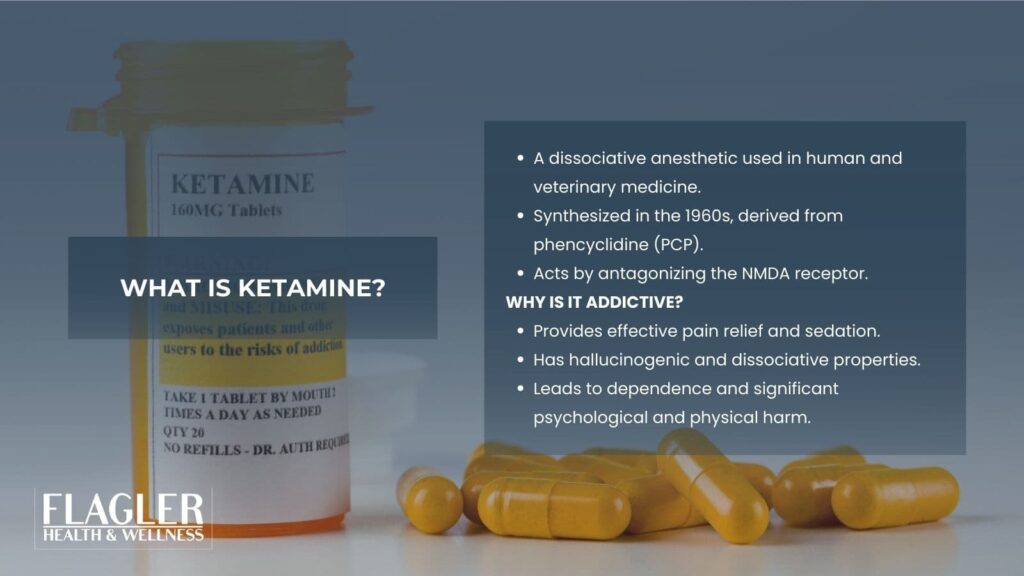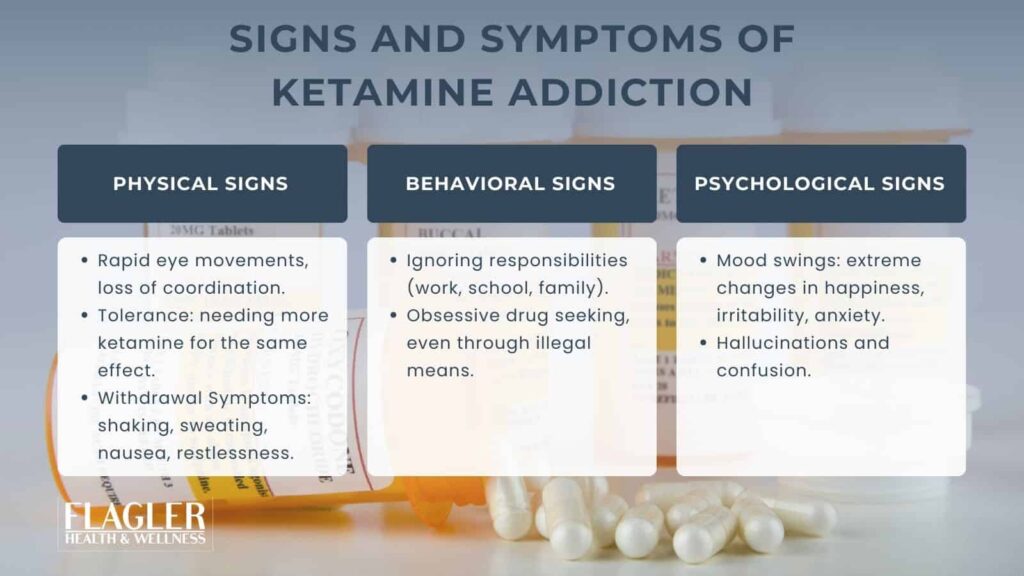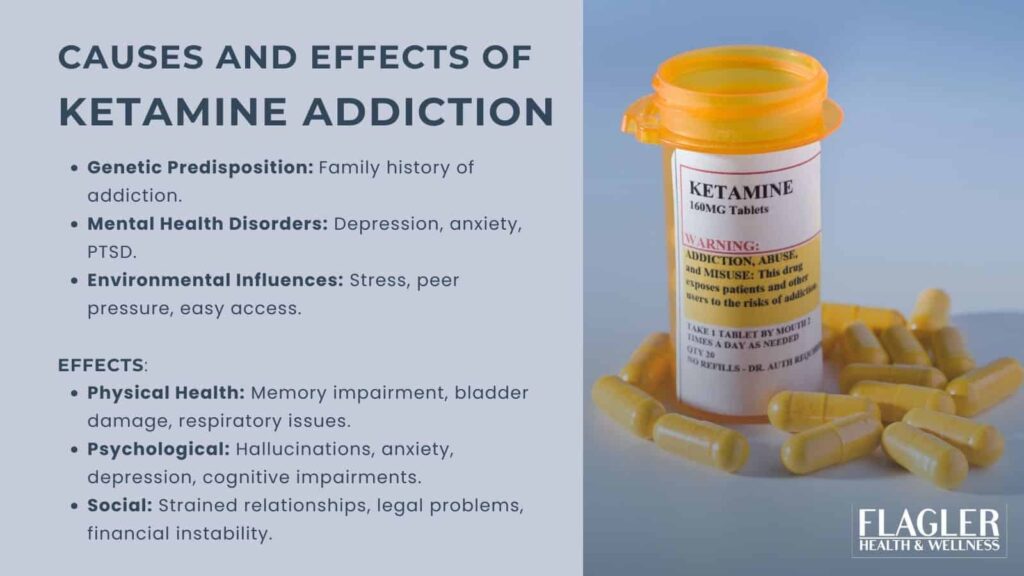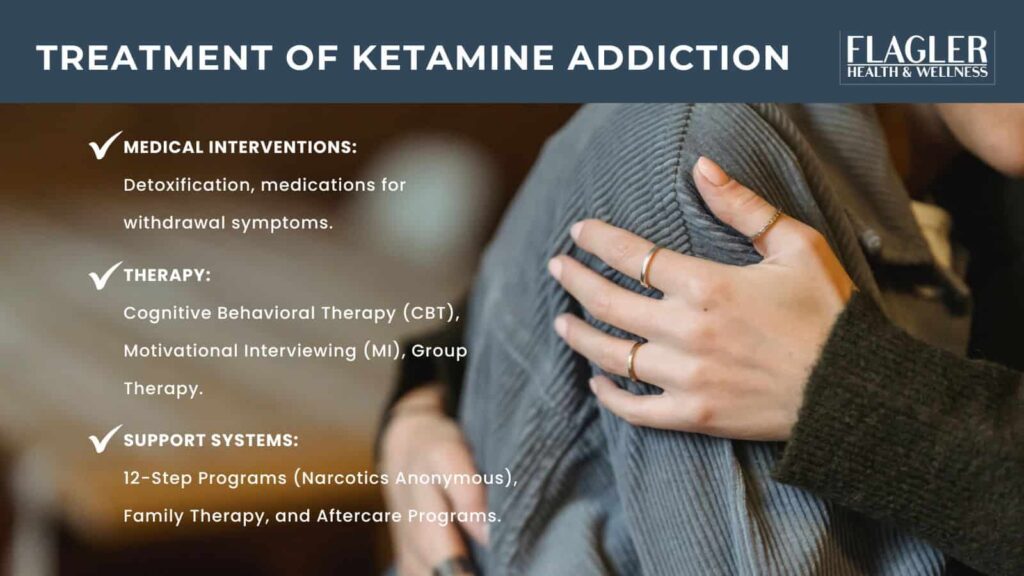Ketamine is a dissociative anesthetic used in both human and veterinary medicine. It was synthesized in the 1960s as a derivative of phencyclidine (PCP). Ketamine acts by antagonizing the NMDA receptor, leading to anesthetic and analgesic effects. However, it also has hallucinogenic and dissociative properties, which makes it a popular drug of abuse. While it provides effective pain relief and sedation, ketamine’s potential for misuse results in dependence and significant psychological and physical harm.
According to a 1997 study, “Ketamine Psychedelic Therapy (KPT) of Alcohol Dependence” by Krupitsky and Grinenko, ketamine-assisted psychotherapy showed promising results, with 66% of patients in the KPT group remaining abstinent after one year, compared to 24% in the control group.
The symptoms of ketamine addiction include intense cravings for the drug, inability to control its use, and continued use despite adverse consequences. Other symptoms are neglecting personal and professional responsibilities, withdrawal from social activities, and experiencing withdrawal symptoms when not using the drug.
The causes of ketamine addiction include genetic predisposition, mental health disorders, and environmental influences. Factors such as stress, peer pressure, and easy access to the drug also contribute to the development of addiction.
The effects of ketamine addiction include severe memory impairment, high blood pressure, and an increased risk of respiratory issues. Psychologically, addiction leads to hallucinations, delirium, depression, and anxiety. Socially, it results in strained relationships, legal problems, and financial instability.
What is Ketamine Addiction?

Ketamine addiction occurs when a person becomes dependent on the drug, characterized by compulsive use despite harmful consequences. This means that even though using ketamine is causing serious problems in their life, the person feels unable to stop using it. Ketamine addiction leads to significant health issues, disrupts personal relationships, and interferes with daily functioning.
For example, someone addicted to ketamine might have intense cravings for the drug, find it impossible to control their use, and continue using it even when it harms their health, job, or relationships. A study by Morgan and Curran titled “Ketamine Use: A Review” (2012) found that regular users of ketamine often experience severe psychological effects, including persistent cravings and the inability to control usage, highlighting the need for effective treatment strategies.
What are the Signs of Ketamine Addiction?

The signs of ketamine addiction include changes in physical health, such as rapid eye movements and loss of coordination; behavioral changes, like increased secrecy and social withdrawal; and psychological aspects, such as mood swings and hallucinations. According to the 2012 study “Ketamine Use: A Review” by Catherine J.A. Morgan and H. Valerie Curran, regular users of ketamine often experience severe psychological effects, including persistent cravings and the inability to control usage, highlighting the need for effective treatment strategies.
Physical Dependency Signs of Ketamine Addiction
- Tolerance: You need to use more ketamine to feel the same effects as before. This means your body has become used to the drug, and you need higher doses to get the same high.
- Withdrawal Symptoms: When you are not using ketamine, you may feel sick with symptoms like shaking, sweating, nausea, and feeling very restless or anxious. These symptoms make it hard to stop using ketamine.
Behavioral Signs of Ketamine Addiction
- Ignoring Responsibilities: You might start neglecting your work, school, or family duties because using ketamine takes up all your time and energy. This causes serious problems in your personal and professional life.
- Obsessive Drug Seeking: You spend a lot of your time and effort trying to get ketamine, even if it means breaking the law or lying to people you care about. This constant need to get the drug shows a significant change in how you behave.
Emotional and Mental Signs of Ketamine Addiction
- Mood Swings: You may experience extreme changes in your mood, feeling very happy when using ketamine and very irritable, anxious, or depressed when you are not using it. These mood swings make it difficult to function normally day-to-day.
- Hallucinations and Confusion: You might see or hear things that are not real, which are very scary and confusing. This makes it hard to tell what is real and what is not, affecting your ability to think clearly.
What are the Causes of Ketamine Addiction?

The causes of ketamine addiction include genetic predisposition, which means a higher likelihood of addiction due to family history; brain chemistry changes, involving alterations in neurotransmitter levels that affect mood and behavior; and mental health disorders, such as depression and anxiety, that increase the risk of substance use. According to the 2022 study “The Abuse Liability of Ketamine: A Scoping Review of Preclinical and Clinical Studies” by Tuyen T. Le et al., these factors significantly contribute to ketamine addiction.
Additionally, coping mechanisms where individuals use ketamine to manage stress or emotional pain, social influences like peer pressure environments where drug use is common, and accessibility to ketamine, whether through medical prescriptions or illegal means, also play crucial roles.
Biological Factors:
- Genetic Predisposition: Some people have a genetic makeup that makes them more likely to become addicted to substances, including ketamine. This genetic predisposition means that addiction runs in families.
- Brain Chemistry: Ketamine affects neurotransmitters in the brain, particularly glutamate. Changes in brain chemistry due to repeated ketamine use lead to dependency and addiction.
Psychological Factors:
- Mental Health Disorders: Individuals with mental health conditions like depression, anxiety, or PTSD might use ketamine to self-medicate. This self-medication quickly leads to addiction as the drug provides temporary relief from their symptoms.
- Coping Mechanisms: People who use ketamine to cope with stress, trauma, or emotional pain are at higher risk of developing an addiction. Relying on the drug as a primary coping mechanism makes quitting difficult.
Environmental Factors:
- Social Influences: Peer pressure and social environments that encourage drug use contribute to the development of ketamine addiction. Being around others who use ketamine increases the likelihood of trying and continuing to use the drug.
- Accessibility: Easy access to ketamine, whether through friends, parties, or online sources, makes it more likely for individuals to use and become addicted to the drug.
What are the Effects of Ketamine Addiction?
The effects of ketamine addiction severely impact physical health, including bladder damage, kidney problems, and cardiovascular issues; mental well-being, which encompasses memory impairment, hallucinations, and severe mood swings; and social life, affecting relationships and responsibilities. According to the 2022 study “Neurocognitive effects of repeated ketamine infusion treatments in patients with treatment-resistant depression: a retrospective chart review” by Bolton et al., chronic ketamine use leads to significant structural and functional brain changes, negatively impacting cognitive performance and mental health.
Physical Health Effects of Ketamine Addiction
- Memory Impairment: Chronic use of ketamine leads to significant memory problems. Users often experience difficulty recalling recent events and forming new memories.
- Bladder Damage: Long-term ketamine use causes severe bladder issues, including pain, frequent urination, and even bladder dysfunction. This condition is sometimes referred to as “ketamine bladder syndrome.”
- Respiratory Issues: High doses of ketamine lead to respiratory depression, where breathing becomes slow or shallow. This is sometimes life-threatening if not addressed promptly.
Psychological Effects of Ketanibne Addiction
- Hallucinations: Ketamine use causes vivid hallucinations, making users see or hear things that aren’t there. These hallucinations are frightening and disorienting.
- Anxiety and Depression: Many users experience increased levels of anxiety and depression. These psychological disturbances persist even after stopping ketamine use.
- Cognitive Impairments: Prolonged ketamine use affects cognitive functions, leading to difficulties with attention, decision-making, and problem-solving.
Social and Relationship Effects of Ketamine Addiction
- Strained Relationships: Addiction often leads to strained relationships with family and friends. The user’s focus on obtaining and using ketamine causes neglect of personal relationships.
- Legal Problems: Engaging in illegal activities to obtain ketamine leads to arrests and legal issues. This further complicates the user’s life and creates additional stress.
- Financial Instability: The cost of sustaining a ketamine addiction leads to significant financial problems. Users spend large amounts of money on the drug, leading to debt and financial hardship.
How is Ketamine Addiction Treated?

Treating ketamine addiction involves a combination of medical interventions, therapy, and support systems. These treatments help individuals stop using ketamine, manage withdrawal symptoms, and address underlying issues contributing to addiction. According to the 2022 study “The Abuse Liability of Ketamine: A Scoping Review of Preclinical and Clinical Studies” by Tuyen T. Le et al., a comprehensive approach that combines medical treatment, therapy, and support systems is most effective in treating ketamine addiction.
1. Medical Interventions
- Detoxification: The first step in treating ketamine addiction is detoxification, where the body clears itself of the drug. Medical supervision during detox helps manage withdrawal symptoms and ensure safety.
- Medications: While there are no specific medications for ketamine addiction, doctors may prescribe drugs to manage symptoms like anxiety, depression, or severe agitation during withdrawal.
2. Therapy
- Cognitive Behavioral Therapy (CBT): CBT helps individuals understand and change their thought patterns and behaviors related to drug use. It teaches coping skills and strategies to handle triggers and stress without turning to ketamine.
- Motivational Interviewing (MI): MI is a counseling approach that helps individuals find the motivation to make positive changes. It is particularly effective in encouraging people to commit to treatment and recovery.
- Group Therapy: Group therapy provides a supportive environment where individuals share experiences, learn from others, and build a sense of community. It helps reduce feelings of isolation and provides mutual support.
3. Support Systems
- 12-Step Programs: Programs like Narcotics Anonymous (NA) offer a structured approach to recovery with a focus on peer support and accountability. These programs provide a framework for individuals to follow during their recovery journey.
- Family Therapy: Family therapy involves the addict’s loved ones in the recovery process. It helps improve communication, resolve conflicts, and rebuild trust within the family unit.
- Aftercare Programs: Aftercare programs provide ongoing support after the initial treatment phase. These programs may include continued therapy, support group meetings, and access to resources that help maintain sobriety.
What is ketamine used for medically?
Ketamine is primarily used as an anesthetic in both human and veterinary medicine. It is used to induce and maintain anesthesia, providing pain relief and sedation during surgeries. In recent years, low doses of ketamine have also been used to treat severe depression and other psychiatric disorders.
Can ketamine addiction be treated successfully?
Yes, ketamine addiction is treated successfully with a comprehensive approach that includes medical treatment, therapy, and support systems. Detoxification, cognitive behavioral therapy, motivational interviewing, and support groups like Narcotics Anonymous are all effective components of treatment.
What are the risks of using ketamine recreationally?
Recreational use of ketamine carries significant risks, including addiction, memory impairment, bladder damage, respiratory issues, and psychological effects like hallucinations and severe mood swings. Recreational use also leads to legal and financial problems.
How does ketamine addiction affect the brain?
Ketamine affects the brain by altering neurotransmitter systems, particularly glutamate. Prolonged use leads to changes in brain structure and function, resulting in cognitive impairments, memory issues, and mental health disorders like anxiety and depression.
What should I do if I suspect someone is addicted to ketamine?
If you suspect someone is addicted to ketamine, encourage them to seek professional help immediately. Support them by providing information about treatment options and offering to assist them in finding a healthcare provider or addiction specialist. Early intervention is crucial for successful recovery.










